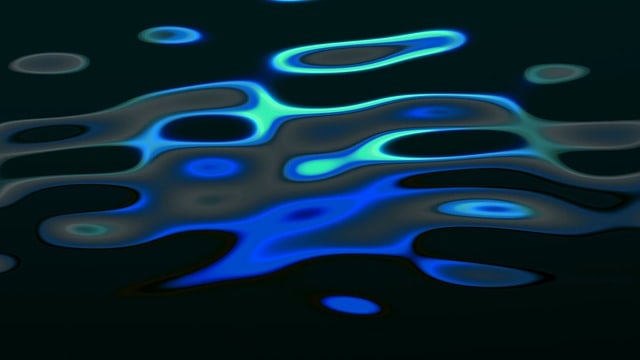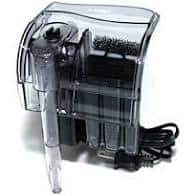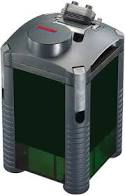Sometimes on the water surface of an aquarium, you will see an oily film. You might wonder where this oily film comes from and if it is dangerous for your shrimp or fish. We will explore the various sources it can come from and if it may signal a bigger underlying problem.
Where does the oily film come from? The oily film can come from several different sources:
- Fish food
- Over Feeding
- Fish waste
- Dead fish
- Hands
- Equipment
- The Environment
Let’s take a closer look at these causes and how big of a problem they can be. After this, we will discuss if the oil film is dangerous for your aquarium and how to eliminate it.

Different Causes That Can Have an Oil Film As a Result:
Fish Food
Some foods we feed our fish contain oils. Often food with a high concentration of animal origin can contain some oils, fat, and protein. When the food dissolves in the water, the oils, fat, and protein can float to the surface. Over time it will form o film on the surface.
I found frozen and dried foods made from blood worms, brine shrimp, and mosquito larvae can cause an oily film if you feed them often. If this is the film’s source, it is harmless, and you can just remove it with a paper towel.
(we will discuss this removal process with the paper towel in more detail further on in this article)
Overfeeding
In the fish food we just discussed in the section about food, we found out they contain oils, fat, and proteins and can cause an oil slick over time. When you are overfeeding, the problems get more serious.
Overfeeding your aquarium will cause all kinds of trouble. Not only will the film form more rapidly, but decaying uneaten food will also spike nitrate levels, which is not good for your fish and shrimp.
Fish Waste
Some fish produce a lot more waste than other fish. The same goes for lots of fish will create lots of waste. If the bacteria in your aquarium and filter cant break these excrements down fast enough, there is a chance a film will form on the surface. Make sure you don’t overstock your fish tank, the build-up of decomposing fish waste will become a problem.
Shrimp, even if many of them will not give you this problem, they don’t produce ‘fish’ waste. But seriously, shrimp have a very low bioload, their excrements will not be significant enough to form a film in your aquarium.
Dead Fish
When fish or shrimp die, fluids can seep into the water. The longer a dead body remains undetected, the more it will decompose and release all kinds of nasty stuff. If you have ruled out the other cause for a sudden oily film, ensure all your fish and shrimp are still swimming.
Hands
Your skin has natural oils, but greasy skin usually does not cause a significant problem. You do, however, have to make sure your hands are clean. Your hands can have other contaminants like skincare products that will cause problems when introduced to your aquarium.
Ensure your hands are washed when working on your shrimp or fish tank and be extra careful to rinse off any soap you might use. Any other chemicals you put on your hands will pollute your tank.
Hands can pose a severe threat to your aquarium if you are not careful, and you can introduce all kinds of contaminants. Even petting your cat or dog can cause the death of your fish and shrimp if they have a flea collar or medication.
Equipment
Your equipment, especially the moving parts of a water pump, can sometimes have grease. If they are not thoroughly rinsed before use, you could inadvertently introduce this grease to your aquarium. Any object you plan to use in your aquarium must be very clean. Even things like scissors or other aquascape tools you use often have an oily film on them from production or put there to protect them for transit.


The Environment
The environment where the aquarium stands can also influence the tank itself. Not only oily base contaminants but also things that will be toxic to your aquarium dwellers. You must be careful of things like frequently spraying deodorants or perfumes/au the toilet will be harmful. The same goes for the automatic fragrance sprayer for the room.
Are Aquarium Oil Slicks Dangerous?
The oil film is not dangerous, but it reduces the regular gas exchange when it covers the water surface, reducing the amount of oxygen in the water. What can be dangerous is the underlying cause of the oil—serious causes like overfeeding, failing equipment, or lack of maintenance.
How to Easily Get Rid of The Oily Film
The quickest way to remove the oily film is to gently lay a piece of paper towel on the surface and remove it a short moment later. You will see the oil sticking to the paper when you remove it, and you might have to do it several times to get it all.
Water changes can also help if you use a cup or some other container to scoop out the water; a siphon will not help you in this case. Getting rid of the oil film will help the oxygen exchange in the short term, but if you don’t investigate its source, it will return. Even worse, if it turns out to be a severe problem, many other things can go wrong with your tank.
How to Prevent the Oil Film in Your Aquarium
Surface agitation is the best way to break up the surface film and help the oxygen exchange. The best way to prevent the oily film from forming in the first place is to find out what the cause is from the list we have discussed here and correct the mistake or imbalance.
Conclusion
As we see in this article, the oily film in your aquarium isn’t necessarily always dangerous, but it can indicate more significant problems. Hopefully, with the examples we discuss, you can deduct the cause of the problem and prevent it in the future.
